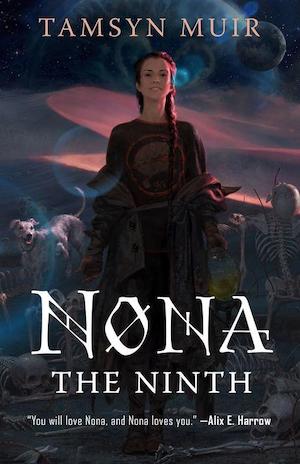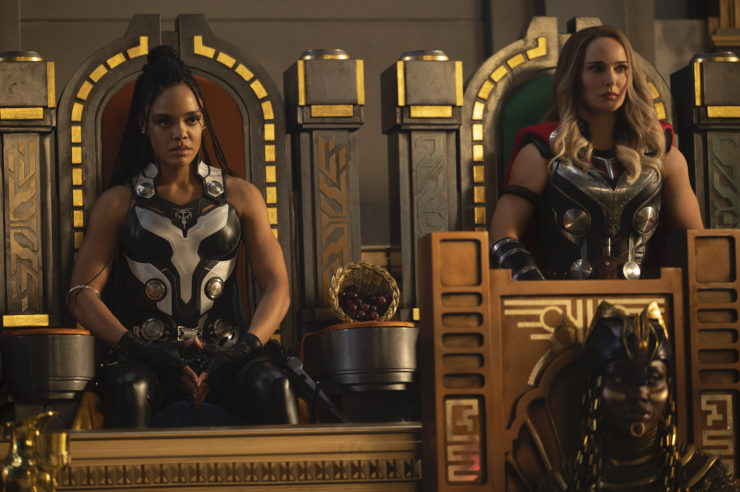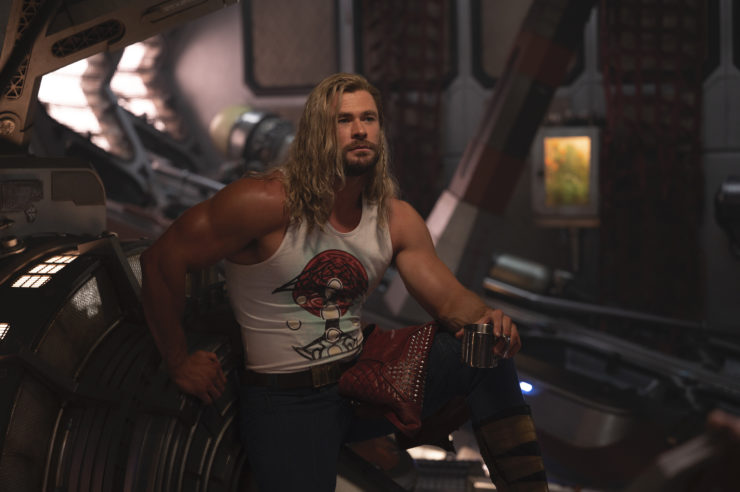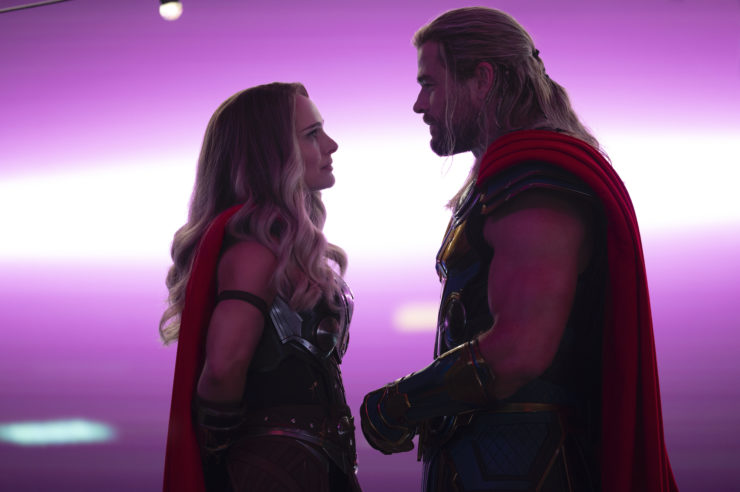After the rousing and wild success that was Thor: Ragnarok, Marvel Studios demanded that Taika Waititi try to bottle lightning… er, and thunder… once again for the next Thor film. The inheritance was an awkward one, given everything that character had been through during the culmination of the first MCU mega-arc: The Asgardian king renounced his throne, lost his brother (after losing everyone else in his family), accidentally allowed Thanos to Snapture the universe by not delivering a killing blow when it was needed, fell into deep depression, spent years in anonymity, and finally got revenge in a final battle that restored most of what was lost. Then he joined the Guardians of the Galaxy and sped away from Earth for a bit.
Midlife crisis does seem like a natural next step on that journey, doesn’t it?
[Some spoilers for Thor: Love and Thunder]
While it’s still not a good look that the MCU had Thor gain weight in depression and promptly throw it off the instant he decided to move toward “recovery,” the film thankfully doesn’t spend too much time on that piece of Thor’s journey. (In any case, the sandbox that directors receive from other Marvel films can’t be blamed on them, though it’s unfortunate watching creative teams have to deal with decisions they were likely never even in the room for.) It also thankfully doesn’t spend an overlong time on Thor’s team-up with the Guardians of the Galaxy, using their shenanigans as a leaping-off point for the work of Gorr the God Butcher.
Buy the Book


Nona the Ninth
Gorr (Christian Bale) is a man who prays to his people’s god to save the life of his daughter, only to learn that their god was nothing but a fickle brute who cared nothing for the lives of the people who prayed to him. Imbued with special powers by an ancient sword, Gorr vows to rid the universe of gods, and begins making quick work of them. When he heads to New Asgard, he promptly kidnaps all of their children in an attempt to lead Thor toward the end of his murderous plan. Marvel films often hinge on how moving or convincing their villains are, and Bale manages to imbue Gorr with enough emotion and whispering creepiness to make the whole exercise worthwhile. Gorr’s pain is clear, his plan surprisingly simple and thought out, and when he takes the time to face down Thor and his party, the menace of his presence is nothing to scoff at.
There are problems with the movie’s editing and transitions, leading to a bit of whiplash in the telling, but it cannot detract from how endearing the film is overall. Moreover, the choice to ape and draw inspiration from ‘80s fantasy films works in Love and Thunder’s favor on that front, allowing certain weak spots in the narrative to read more like parody, overcoming the shakiness with sheer charm. The soundtrack is wicked smart in its application of hair metal (and Enya?!), the visuals are frequently stunning, and the fight sequences largely avoid the now house-style Marvel-fight-soup that frequently brings these films down in their final act. Fans who prefer their superhero romps free of abundant comedy aren’t likely to enjoy the film at all, but that’s entirely a matter of personal preference, and one that this reviewer is particularly tired of seeing trotted out as a point of criticism. (Make me laugh. Please, for the love of anything good in this world, keep making me laugh.)
While Taika Waititi’s sensibilities skew toward the comical in every sense, there is always a sharp core of trauma enrobed at the center. The appearance of New Asgard is a testament to this, and cannot help but read as a commentary on the touristification of his own Maori heritage—watching Asgardians turn their culture into an interactive model village for curious humans, complete with cruise ship activities, historical reenactments, and Infinity Conez, is certainly worth a laugh… until the full weight of that construct catches up to you. The need to make your people and their vibrant history into a theme park to ensure your survival isn’t remotely funny, and its presence in the story is a direct dig at everything that Marvel’s Disney overlords do to real people in their endless quest to absorb as much cash as reality will allow.
Waititi spent a lot of interviews leading up to this film’s release telling the world that Love and Thunder was a love story, one that he was determined not to shy away from because he could be very cynical, or perhaps too ironic, about romantic entanglement. And sure, the relationship between Thor (Chris Hemsworth) and Jane Foster (Natalie Portman) is central to the narrative of the film, but I’m gonna call bullshit on that framing. Love and Thunder is not a romantic film at its center—if anything, it’s a treatise on all forms of love and how this ephemeral feeling shapes us as people. How it makes and unmakes us all. Why it’s the only thing that really matters.

To that effect, the film makes an effort to shower us with as many different types of love as possible, even to the point of delightful absurdity—the key love triangle of the movie is thankfully not one between Thor and Jane and Valkyrie (Tessa Thompson), as traditional tenets would dictate (though Val is pointedly “Team Jane” and fully prepared to sweep her off her feet if Thor screws up his shot), but rather between Thor and his beloved weaponry, Mjolnir and Stormbreaker. Seeing Jane wield his former hammer proves to be far too much for the thunder god to handle, and Stormbreaker can sense his wandering eye and frequently seems to be shaming or ignoring him for it. In order to see any part of this adventure through, Thor is required to take Stormbreaker’s feelings into account. This should not work by any stretch of the imagination, and only does because Hemsworth fully commits to the bit so hard that it u-turns back around toward genuine emotion.
Thor and Jane’s romance does take center stage for the majority of the film, but not in a manner of a romcom or even a serious drama. For the first time in the MCU’s history, all the work Natalie Portman did quietly over two films to make Jane a compelling, fully articulated character comes to fruition. The relationship between Thor and Jane, even as a retrospective, makes far more sense in this film than it did in the movies where we actually watched them be in love with each other. But more importantly, Jane’s life, her quirks, her major contributions to science, are given their due. These factors are complicated, of course, by pulling directly from the Mighty Thor comics arc which saw Dr. Foster becoming Thor in response to a Stage Four cancer diagnosis. The question then becomes whether Jane will continue her heroics until death, or quit for another chance to be with Thor. But while their partnership is deeply meaningful for both of them, there’s never the suggestion that romantic love must then become “The Answer” for either or them, no matter how much they might wish it to be.
Instead, the film sets its sights on many other kinds of love, not as a response or rebuttal to romance, but as a broadening of scope and definition. There’s familial love (the role of Heimdall’s son, Axl; Gorr’s pain over the loss of his daughter; Thor’s ever-present grief over Loki’s death), friendship (Jane and Darcy’s constant ribbing; Jane and Valkyrie’s instant and steadfast support of one another; Korg’s blunt but tender bolstering of everyone), even the love of story and history and myth (Korg’s tales to children; Thor’s frequent attempts to shore others up with messy speeches and “Thor adventures”; the Asgardian theatre troupe’s continued low-budget antics). This definition extends far beyond the narrative and into the meta framing of the film, particularly by way of the casting—many of the actor’s children show up in the frames, Waititi’s friends are everywhere, Chris Hemworth’s wife and brother make appearances. Love, and the people who offer it freely, is all over in this movie, pressed into each nook and cranny.

The focus on children and the importance of caring for them thankfully never skews into the realm of “children are the only reason for being in the universe,” which is a common fictional clarion call. This is likely because that focus is never couched in the need for a nuclear family unit; Waititi’s focus on family is undeniably queer in its construction (ask Korg how he was born again) and eschews heteronormativity even when characters seem to be asking for it. What results is a story that seems intent on highlighting the types of love that uplift us, that make us better and whole.
So while Ragnarok might still be the stronger film in a more technical sense, Love and Thunder is a worthy addition to Waititi’s oeuvre, and a welcome shot in the arm to the MCU’s ever-homogenizing options. Here’s hoping that they’ll be back again before too long.
Emmet Asher-Perrin is still pretty awed by how the film’s title and use of “Sweet Child o’ Mine” came back around on this one. You can bug them on Twitter and Tumblr, and read more of their work here and elsewhere.










